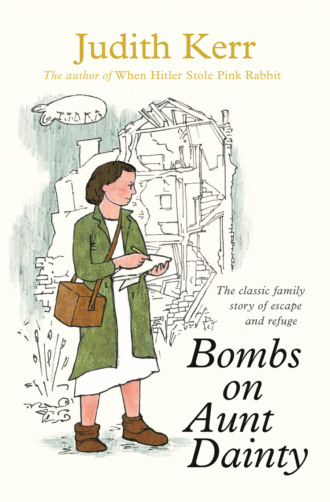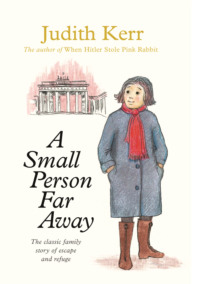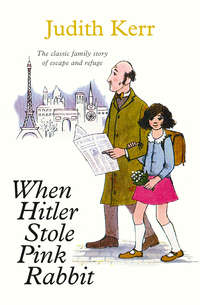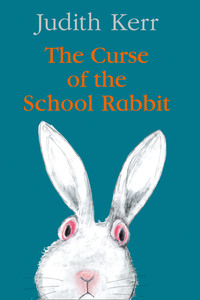
Полная версия
Bombs on Aunt Dainty
“Why on earth not?”
“It seems he’s too famous. The Germans all know that he’s violently anti-Nazi, so they won’t take any notice of anything he says. At least that’s the theory.”
Max shook his head. “I thought he looked old and tired.” He waited for her to catch him up before he asked, “And what about you?”
“Me? I don’t know.” Suddenly Anna didn’t seem to be able to think of anything but her feet. “I suppose I’m all right,” she said vaguely.
Max looked worried. “But you like your art course?” he asked. “You enjoy that?”
The feet receded slightly from Anna’s consciousness.
“Yes,” she said, “but it’s all so hopeless, isn’t it, when no one has any money? I mean, you read about artists leaving their homes to live in a garret, but if your family is living in a garret already…! I thought perhaps I should get a job.”
“You’re not sixteen yet,” said Max and added almost angrily, “I seem to have had all the luck.”
“Don’t be silly,” said Anna. “A major scholarship to Cambridge isn’t luck.”
They had arrived at Russell Square tube station and one of the lifts was about to close its gates, ready to descend.
“Well—” said Anna, but Max hesitated.
“Listen,” he cried, “why don’t you come up to Cambridge for a weekend?” And as Anna was about to demur, “I can manage the money. You could meet some of my friends and I could show you round a bit – it would be fun!” The lift gates creaked and he made a dash for it. “I’ll write you the details,” he cried as he and the lift sank from sight.
Anna walked slowly back to the hotel. Mama and Papa were waiting for her at one of the tables in the lounge and a faded German lady had joined them.
“…the opera in Berlin,” the German lady was saying to Papa. “You were in the third row of the stalls. I remember my husband pointing you out. I was so excited, and you wrote a marvellous piece about it next morning in the paper.”
Papa was smiling politely.
“Lohengrin, I think,” said the German lady. “Unless it was the Magic Flute or perhaps Aîda. Anyway, it was wonderful. Everything was wonderful in those days.”
Then Papa saw Anna. “Excuse me,” he said. He bowed to the German lady and he and Mama and Anna went into the dining-room for lunch.
“Who was that?” asked Anna.
“The wife of a German publisher,” said Papa. “She got out but the Nazis killed her husband.”
Mama said, “God knows what she lives on.”
It was the usual Sunday lunch, served by a Swiss girl who was trying to learn English but was more likely to pick up a bit of Polish in this place, thought Anna. There were prunes for pudding and there was some difficulty afterwards about paying for Anna’s meal. The Swiss waitress said she would put it on the bill, but Mama said no, it was not an extra item since she herself had missed dinner on the previous Tuesday when she wasn’t feeling well. The waitress said she wasn’t sure if it was all right to transfer meals from one person to another. Mama got excited and Papa looked unhappy and said, “Please don’t make a scene.” In the end the manageress had to be consulted and decided that it was all right this time but must not be regarded as a precedent. By this time a lot of the good had gone out of the day.
“Shall we sit down here or shall we go upstairs?” said Mama when they were back in the lounge – but the German lady was looming and Anna didn’t want to talk about the opera in Berlin, so they went upstairs. Papa perched on the chair, and Anna and Mama sat on the bed.
“I mustn’t forget to give you your fare money for next week,” said Mama, opening her handbag.
Anna looked at her.
“Mama,” she said, “I think I ought to get a job.”
Конец ознакомительного фрагмента.
Текст предоставлен ООО «ЛитРес».
Прочитайте эту книгу целиком, купив полную легальную версию на ЛитРес.
Безопасно оплатить книгу можно банковской картой Visa, MasterCard, Maestro, со счета мобильного телефона, с платежного терминала, в салоне МТС или Связной, через PayPal, WebMoney, Яндекс.Деньги, QIWI Кошелек, бонусными картами или другим удобным Вам способом.





